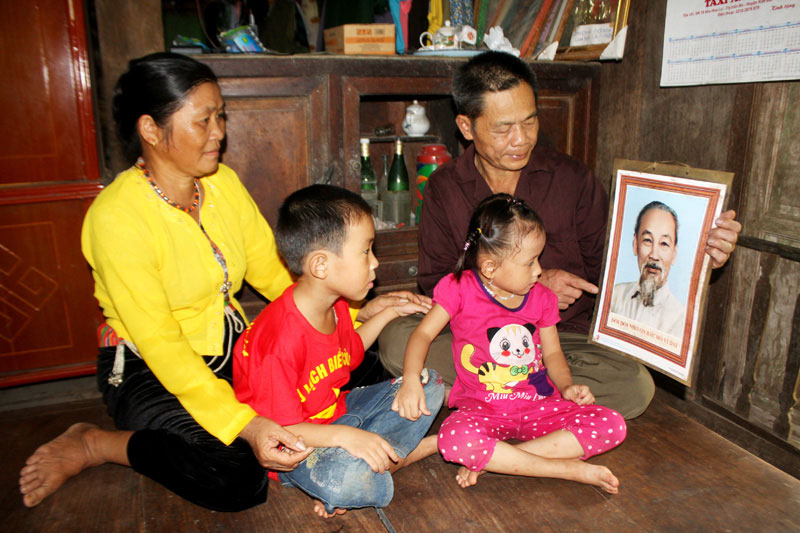
(HBO) - Locals in Nuoc Ruong village inhabited by Muong ethnic people do not remember when the tradition of hanging the picture of late President Ho Chi Minh (Uncle Ho) on a solemn place near the ancestral altar began. They only know that from the hard time struggling with poverty in the past to the prosperous today, every family in the village has always hung the late leader’s photo.
Nuoc
Ruong is home to more than 90 Muong ethnic minority households in Nam Thuong
commune, Kim Boi district. Located far from the centre of the commune, Nuoc
Ruong was once the poorest village in Nam Thuong. However, in recent years,
when difficulties in infrastructure were gradually removed, this mountainous
area has strongly developed.

Bui Van
Lap, a local in Nuoc Ruong village, Nam Thuong commune of Kim Boi district reminds
his descendants to always show gratitude to the Party and Uncle Ho.
It is a fact that any household has an Uncle
Ho's image hung on a solemn position. Xiem, a villager, said that since ancient
times, people have had a tradition of worshiping ancestors, but he does not know
when locals started hanging photos of Uncle Ho in their houses. He just knows
that this tradition has existed for a long time. From the past when the economy
was still difficult to the present, in every house, Uncle Ho's image has always
been present next to the altar of ancestors.
We visited the family of Bui Van Lap, an elderly
in the village. Lap said: "Without the Party and Uncle Ho, there is no
independence and freedom and our village does not have a good life today. We
hang Uncle Ho’s photos to remind our descendents to keep in their mind the
services of the Party and Uncle Ho, thus working hard to develop the homeland”.
When
he was young, Lap spent six years and 10 months joining the anti-US resistance war.
He was also sent to
Cambodiafor international missions. In the conversation with us, he highlighted the
value of independence, freedom and the leading role of the Party and Uncle Ho.
Lap
said with a smile: "In the past, there were no electricity, roads, schools
and health stations, so poverty stayed persistently in the village. Now our
life has changed a lot thanks to the Party and Uncle Ho.”
Nam Thuong commune has fulfilled all criteria set
for a new-style rural area. Nuoc Ruong village had the lowest starting point in
the movement. Even though the village is still in the group with lower economic
performance, locals in the mountainous locality are still proud. "Before
the Party and State launched the new-style rural area building campaign, the
road to the village was very small, tough and muddy after rain. Thanks to the implementation
of the programme, locals understood that the new-style rural area building aims
to better their lives, so they have enthusiastically participated in it by
donating land, planting trees and contributing working days. In 2012, Nuoc
Ruong became the third village receiving a certificate of merit from the
provincial People's Committee for outstanding achievements in building
new-style rural area./.
In the spirit of "Party members go first, the people follow”, all households of Party members in the Doan Ket sub-region in Da Bac town, Da Bac district, voluntarily removed gates and fences, and donated land when the road expansion project passed through their properties. Inspired by their example, 68 households in the sub-region quickly followed suit, contributing over 1,400 sq.m of residential and perennial cropland to widen the main road through the residential area. The exemplary role of Party members in Doan Ket stands as a shining example of studying and following President Ho Chi Minh’s thought, morality, and lifestyle.
The Hoa Binh provincial People's Committee held a monthly meeting on May 29 to assess the implementation of socio-economic development tasks in the first six months of 2025, the progress of key projects, and some other important issues.
During his lifetime, President Ho Chi Minh always expressed his deep affection and special concern for children and youth. He once emphasized: "Caring for and educating children well is the responsibility of the entire Party and the entire people”; "First of all, the family (i.e. grandparents, parents, siblings) must do this job well”. "the Party Committees…, the Children’s Committee, the Youth Union, the education sector, and all related organizations must have specific plans to ensure children grow healthier and more progressive”. His teachings has been remaining valuable and serving as the guiding principles in the work of protecting, caring for, and educating children. In line with this ideology, Hoa Binh Province has continuously been prioritizing and investing resources in the well-being of children in recent years.
Mr. Nguyen Phi Long, the alternate Member of the Party Central Committee and Secretary of the Provincial Party Committee chaired the meeting of the Standing Committee of the Provincial Party Committee to provide opinions on several investment projects within the province. There was the attendance of Ms. Bui Thi Minh, the Permanent Deputy Secretary of the Provincial Party Committee and Chairwoman of the Provincial People’s Council; Mr. Bui Đuc Hinh, the Deputy Secretary of the Provincial Party Committee and Chairman of the Provincial People’s Committee and other members of the Standing Committee; the leaders from other departments, agencies, and some localities.
The Standing Board of the Vietnam Fatherland Front (VFF) Committee of Hoa Binh province held a meeting on May 28 to honour outstanding village elders, village heads, and reputable individuals from local ethnic minority and religious communities.
In mid-May, the provincial Museum organised an exhibition named "Duoi la co Dang Cong san Viet Nam quang vinh” (Under the flag of the glorious Communist Party of Vietnam). This meaningful activity took place in the joyful atmosphere to celebrate the country's major holidays and the Party congresses at all levels for the 2025-2030 term, towards the 14th National Party Congress.



